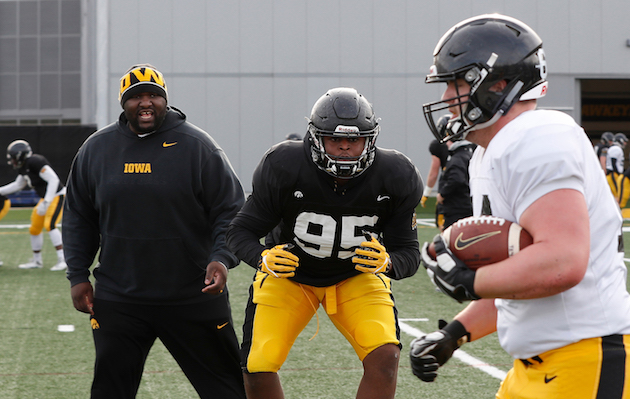Iowa coaches talk about verdict in George Floyd trial
By Tyler Devine
IOWA CITY, Iowa – Like millions around the world on Tuesday, Iowa defensive line coach Kelvin Bell was waiting with bated breath for the verdict to be handed down in the trial of the murder of George Floyd.
Former Minneapolis police officer Derek Chauvin, who knelt on Floyd’s neck for more than nine minutes last May, was found guilty on charges of second-degree unintentional murder, third-degree murder and second-degree manslaughter.
Bell, who is Black, said the day was filled with sadness and relief, and served as a reminder of how much farther there is to go with regard to racial injustice in the United States.
“The sadness was because it opened some old wounds from last year when George Floyd was murdered,” Bell said. “It opened some old wounds there. It did happen, it brought it back, it brought it to the forefront. So it created some sorrow just in my heart. But there was also some relief, too, in the verdict. Even though people saw what they saw on camera, I wasn’t one to raise my hand and be a slam dunk conviction on that case.
“I think that goes to show you, even if you can see a man be murdered on camera, for the world to see, and for you to still have doubt that the perpetrator will be convicted of murder shows you how much further we have to go. Just in terms of race relations, in terms of accountability, in terms of justice because I’ve seen it where it didn’t go that way. A long way yet still to go in terms of race relations and police relations. A long way to go in terms of justice and reform. But this case helped shed light, and hopefully through the power of social media, people are able to see exactly what happened. This case reached limits that the Rodney King trial never reached just because of social media.”
In the wake of Floyd’s murder, several former Iowa players came forward with allegations of racial bias within the Iowa program, most of which centered around former strength and conditioning coach Chris Doyle.
Doyle and Iowa eventually agreed to a separation agreement and the allegations were investigated by Kansas City law firm Husch-Blackwell.
Some of the allegations involved head coach Kirk Ferentz and his son, offensive coordinator Brian Ferentz.
Brian Ferentz gave his thoughts Wednesday on the verdict and how the coaching staff and players have handled the conversation surrounding race since last summer.
“It comes down to respect,” Brian Ferentz said. “That’s respect for one another on a personal level. It’s respect for the job that everyone does and understanding how difficult that is. Once you’ve built that respect I think you can have some real conversations and move forward.
“We’re going to continue to be open within our program. We’re going to continue to be open to evolving and changing as times change around us. But ultimately, our job is to support our players. Our job is to make sure their needs are met emotionally, and that’s what we’re trying to do now.”
Wallace was not implicated in the allegations of racial bias, but was accused of bullying by former defensive lineman Jack Kallenberger, who is white.
Wallace was asked Wednesday about his personal growth over the last year and what the conversation has been like among the players and coaching staff.
“The one thing that you do realize,” Wallace said. “Through conversation like we had this morning, we’re so far away from where this thing is going. I don’t know that we’ve gotten any closer, and I’m talking about the more global picture of things. But we can do the work here in our building. We can spend more time with each other and get to know each other better and have those conversations. If we do that, we’ve got a chance to affect those on the outside. It’s been a good process for us.”



